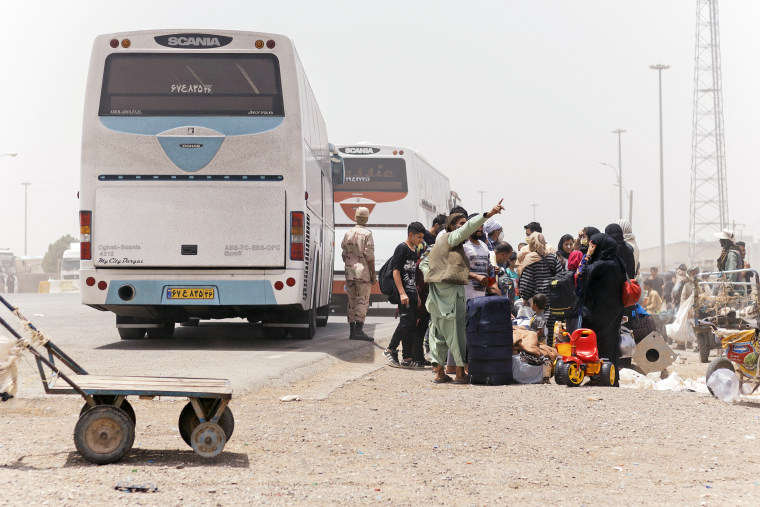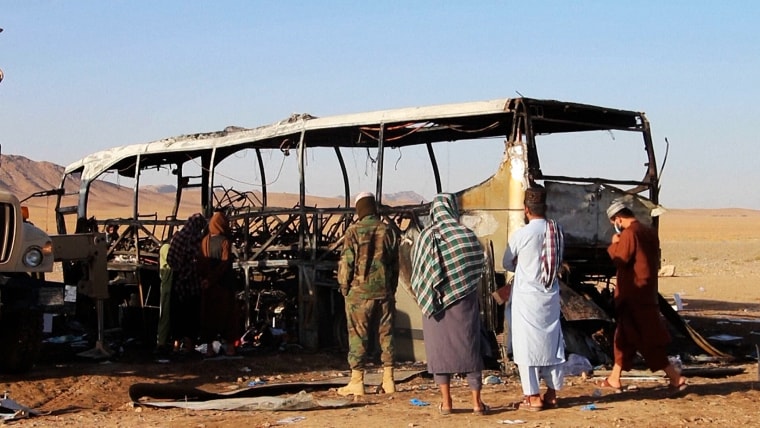PESHAWAR, Pakistan — At least 75 people, including 17 children, have been killed in Afghanistan in a traffic accident involving a bus carrying migrants who were deported from Iran, officials said Wednesday.
The bus was traveling to the Afghan capital, Kabul, from neighboring Iran late Tuesday when it collided with a motorbike and another vehicle in the western province of Herat near the Iranian border, according to senior Afghan government official Ahmadullah Muttaqi.
“The car was carrying fuel, and it caught fire after a head-on collision with the bus, fully loaded with passengers,” he said. “The bus also caught fire, and the majority of people on the bus died of burn injuries.”
All 73 Afghan migrants on the bus, 17 of them children, were killed, along with two people from the other vehicles. Two other people were injured, Muttaqi said.
The migrants are among hundreds of thousands of Afghans who have returned in recent months from Iran and Pakistan, both of which announced a crackdown in October 2023 on people they said were living there illegally.

There are fears that Afghanistan could be further destabilized by the mass expulsions, which have been criticized by international rights groups, as well as Afghanistan’s ruling Taliban, as a violation of international norms and humanitarian principles. Many of those returning have lived outside Afghanistan for decades and are able to bring only what they can carry.
“These Afghan refugees were returning home after spending a long time in Iran, but they could not reach their destination as their bus met with a tragic accident,” Muttaqi said.
Traffic accidents are common in Afghanistan, where decades of war have left roads in disrepair and traffic laws are poorly enforced.
Since the 1970s, millions of people have fled Afghanistan for Iran and Pakistan, especially during the Soviet invasion in 1979 and the Taliban’s return to power in 2021. Afghan migrants in both countries say they have faced systemic discrimination and even violence.
U.N. human rights officials said last week that over 2.2 million people had returned to Afghanistan from Iran and Pakistan since the start of the year — more than 1.8 million from Iran and almost 400,000 from Pakistan. Authorities in both countries deny they are targeting Afghans specifically.
Experts say many of the Afghan migrants were either forcibly deported or compelled to return in the face of threats, harassment and intimidation.
Iran had told undocumented Afghans to leave the country by July 6, but departures accelerated amid a 12-day conflict in June between Iran and Israel, during which some Iranians accused Afghan migrants of espionage. The deadline has since been extended to Sept. 6.

The U.N. says that the surge in the number of people returning to Afghanistan has created a “multi-layered human rights crisis” and that some have been tortured and threatened by the Taliban because of their identities or personal histories. It says women and girls face an even higher risk of persecution in Afghanistan, where they are denied access to education past the sixth grade.
Taliban officials say that people returning to Afghanistan are not being mistreated and that they receive cash, food, health care and other support upon their arrival.
Afghanistan is already struggling to provide basic services to its population of more than 40 million, more than half of which relies on humanitarian assistance even as U.S. and other international funding is cut.
Thousands of Afghans in the United States also face deportation after a federal appeals court last month allowed the Trump administration to remove protections enabling them to live and work in the country temporarily.
Trump administration officials said Afghans in the United States no longer needed protected status because the situation in their home country is getting better.
Mushtaq Yusufzai reported from Peshawar and Jennifer Jett from Hong Kong.
